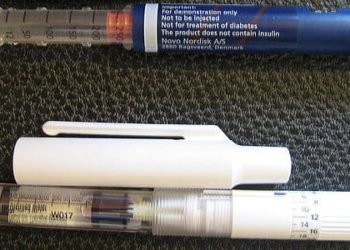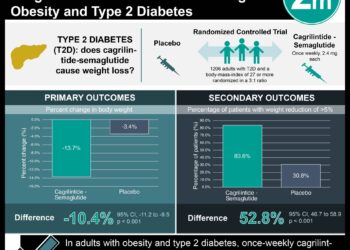Familial hypercholesterolemia linked with lower prevalence of type 2 diabetes mellitus
1. The prevalence of type 2 diabetes mellitus was significantly lower in patients with familial hypercholesterolemia compared to unaffected relatives.
2. There was an inverse dose-response relationship between severity of the mutation causing familial hypercholesterolemia and prevalence of type 2 diabetes.
Evidence Rating Level: 2 (Good)
Study Rundown: It has been observed that patients with familial hypercholesterolemia may be less prone to developing type 2 diabetes mellitus. Familial hypercholesterolemia is a heritable disorder characterized by impaired cholesterol transport in peripheral tissues. Commonly, patients carrying a mutation in the apolipoprotein B gene (APOB) express a less-severe phenotype compared to patients carrying one in the low-density lipoprotein receptor gene (LDLR). Among LDLR mutation subtypes, receptor-defective mutations are considered less severe than receptor-negative. A cross-sectional study was used to assess the association between familial hypercholesterolemia and type 2 diabetes. The authors found that the prevalence of type 2 diabetes was lower among patients with familial hypercholesterolemia compared to their unaffected relatives. Additionally, they observed that the prevalence of type 2 diabetes was higher the less severe the mutation causing familial hypercholesterolemia.
The major strength of this study is its large study population: over 63,000 Dutch patients screened for familial hypercholesterolemia from 1994 to 2014 were included in this study. Of these, approximately 25,000 were diagnosed with familial hypercholesterolemia, with the remainder classified as unaffected relatives. However, as a cross-sectional study, it cannot be used to ascertain a causal relationship. Overall, this study establishes an association between familial hypercholesterolemia and a lower prevalence of type 2 diabetes. It also raises the possibility of a link between increased transmembrane cholesterol transport and development of type 2 diabetes.
Click to read the study, published today in JAMA
Click to read an accompanying editorial in JAMA
Relevant Reading: Risk of Incident Diabetes With Intensive-Dose Compared With Moderate-Dose Statin Therapy
In-Depth [cross-sectional study]: The main outcome of this study was to assess the association between the prevalence of type 2 diabetes and familial hypercholesterolemia in 63,320 individuals who underwent DNA testing for familial hypercholesterolemia in the Netherlands between 1994 and 2014. After adjustment, the prevalence of type 2 diabetes was 1.44% in familial hypercholesterolemia versus 3.26% in unaffected relatives (OR=0.49, p<0.001). LDLR mutations are considered to be more severe than APOB mutations. LDLR mutations can be further divided into two subtypes: receptor-negative and receptor-defective, of which former is more severe than the latter. The prevalence of type 2 diabetes in those with an APOB mutation was 1.91% (OR=0.65, p<0.001), while an LDLR mutation conferred a prevalence rate of 1.33% (OR=0.45, p<0.001). The prevalence of type 2 diabetes in LDL receptor-negative versus receptor-defective mutations was 1.12% versus 1.44% (OR 0.38 versus 0.49), respectively (p<0.001). Taken together, these results suggest an inverse dose-dependent relationship between severity of the familial hypercholesterolemia mutation and prevalence of type 2 diabetes.
Image: PD
©2015 2 Minute Medicine, Inc. All rights reserved. No works may be reproduced without expressed written consent from 2 Minute Medicine, Inc. Inquire about licensing here. No article should be construed as medical advice and is not intended as such by the authors or by 2 Minute Medicine, Inc.









